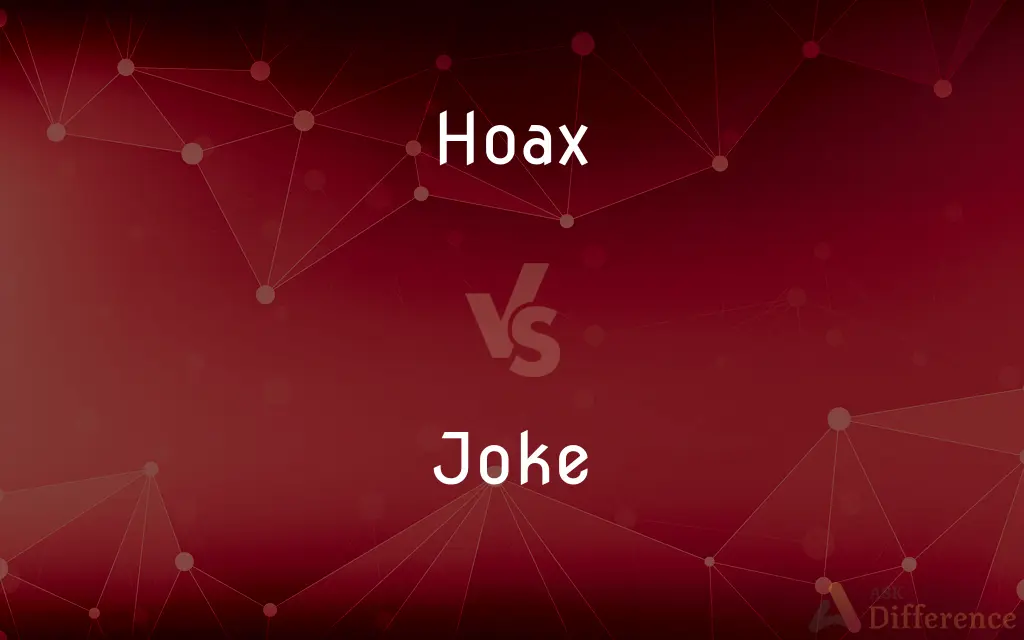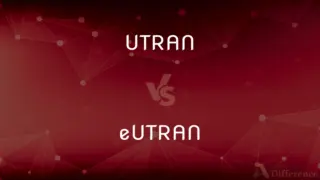Hoax vs. Joke — What's the Difference?
By Tayyaba Rehman & Fiza Rafique — Published on February 7, 2024
A hoax is a deliberate deception often with a serious intent, whereas a joke is a humorous or light-hearted remark or story meant for amusement.

Difference Between Hoax and Joke
Table of Contents
ADVERTISEMENT
Key Differences
A hoax is typically a false claim or story, created with the intention to deceive or mislead. It's often serious and can have significant consequences. A joke, however, is designed for entertainment and laughter, usually without any intention of causing harm or spreading misinformation.
The intent behind a hoax is often to manipulate or provoke a reaction, sometimes for personal gain or to highlight an issue. It is not necessarily humorous and can lead to confusion or panic. In contrast, a joke is meant to amuse and is generally understood not to be taken seriously.
In terms of reception, a hoax can cause distrust and harm once revealed, impacting credibility. A joke, if well-received, enhances social interactions and bonds, though it can sometimes offend if misunderstood or inappropriate.
The scope of a hoax can be wide-ranging, affecting many people and sometimes perpetuating false beliefs or theories. A joke, on the other hand, is often shared in a limited context, such as among friends or an audience, with the expectation of immediate or short-term amusement.
Duration is another factor. A hoax can persist over an extended period, with its deceptive nature not immediately obvious. A joke is typically immediate, with the humor often apparent in the delivery or the punchline.
ADVERTISEMENT
Comparison Chart
Intent
To deceive or mislead
To amuse or entertain
Consequence
Can cause harm or spread misinformation
Generally harmless
Reception
Often leads to distrust once revealed
Enhances social interaction if well-received
Scope
Can affect a wide audience
Usually shared in a limited context
Duration
Can last for an extended period
Immediate, with short-term impact
Compare with Definitions
Hoax
A hoax often has a serious or harmful intent.
The fake news story was a hoax that caused unnecessary panic.
Joke
A joke can be a playful or light-hearted story.
She shared a joke about two tomatoes crossing the road to lighten the mood.
Hoax
A hoax may be designed to create confusion.
The hoax about the company going bankrupt spread rapidly on social media.
Joke
A joke is a humorous or witty remark.
He made a joke about his cooking skills, and everyone laughed.
Hoax
A hoax can be a fraudulent claim or story.
The announced miracle cure for a disease was later exposed as a hoax.
Joke
A joke may involve a punchline or funny twist.
The joke ended with an unexpected punchline that caught everyone off-guard.
Hoax
A hoax is a deliberate act of deception.
The online article about a celebrity's fake death was actually a hoax.
Joke
A joke is intended for laughter or amusement.
The comedian's joke had the whole audience roaring with laughter.
Hoax
A hoax is intended to mislead or trick.
The rumor of an alien invasion turned out to be a carefully orchestrated hoax.
Joke
A joke is often shared in a social setting.
At the party, his joke about the absent-minded professor was a hit.
Hoax
An act intended to deceive or trick.
Joke
Something said or done to evoke laughter or amusement, especially an amusing story with a punch line.
Hoax
Something that has been established or accepted by fraudulent means.
Joke
A mischievous trick; a prank
Played a joke on his roommate.
Hoax
To deceive or cheat by using a hoax.
Joke
Something that is of ludicrously poor quality
Their delivery service is a joke.
Hoax
(transitive) To deceive (someone) by making them believe something that has been maliciously or mischievously fabricated.
Joke
Something not to be taken seriously; a triviality
The accident was no joke.
Hoax
Anything deliberately intended to deceive or trick.
The phone call to the police about a tiger in a tree turned out to be a hoax.
The news story about the pop singer coming to town, unfortunately for his fans, turned out to be a hoax.
Joke
An object of amusement or laughter; a laughingstock
His loud tie was the joke of the office.
Hoax
A deception for mockery or mischief; a deceptive trick or story; a practical joke.
Joke
To tell or play jokes; jest.
Hoax
To deceive by a story or a trick, for sport or mischief; to impose upon sportively.
Joke
To speak in fun; be facetious
You have to be joking.
Hoax
Something intended to deceive; deliberate trickery intended to gain an advantage
Joke
To say or write as a joke.
Hoax
Subject to a palyful hoax or joke
Joke
An amusing story.
Joke
Something said or done for amusement, not in seriousness.
It was a joke!
Joke
(figuratively) The root cause or main issue, especially an unexpected one
Joke
(figuratively) A laughably worthless thing or person; a sham.
Your effort at cleaning your room is a joke.
The president was a joke.
Joke
(figuratively) Something that is far easier or far less challenging than expected.
The final exam was a joke.
Joke
(intransitive) To do or say something for amusement rather than seriously.
I didn’t mean what I said — I was only joking.
Joke
(intransitive, followed by with) To dupe in a friendly manner for amusement; to mess with, play with.
Relax, man, I'm just joking with you.
Joke
To make merry with; to make jokes upon; to rally.
To joke a comrade
Joke
Something said for the sake of exciting a laugh; something witty or sportive (commonly indicating more of hilarity or humor than jest); a jest; a witticism; as, to crack good-natured jokes.
And gentle dullness ever loves a joke.
Or witty joke our airy senses movesTo pleasant laughter.
Joke
Something not said seriously, or not actually meant; something done in sport.
Inclose whole downs in walls, 't is all a joke.
Joke
To make merry with; to make jokes upon; to rally; to banter; as, to joke a comrade.
Joke
To do something for sport, or as a joke; to be merry in words or actions; to jest.
He laughed, shouted, joked, and swore.
Joke
A humorous anecdote or remark intended to provoke laughter;
He told a very funny joke
He knows a million gags
Thanks for the laugh
He laughed unpleasantly at hisown jest
Even a schoolboy's jape is supposed to have some ascertainable point
Joke
Activity characterized by good humor
Joke
A ludicrous or grotesque act done for fun and amusement
Joke
A triviality not to be taken seriously;
I regarded his campaign for mayor as a joke
Joke
Tell a joke; speak humorously;
He often jokes even when he appears serious
Joke
Act in a funny or teasing way
Common Curiosities
Can a hoax be harmless?
While possible, most hoaxes are designed to deceive and can have negative consequences.
Are jokes always funny?
Humor is subjective; what is funny to some may not be to others.
How can a hoax impact society?
Hoaxes can spread misinformation, cause panic, and erode trust.
What defines a hoax?
A hoax is a deliberate deception, often with serious or harmful intent.
What are some famous hoaxes in history?
Examples include the Piltdown Man, War of the Worlds broadcast, and the Loch Ness Monster photo.
Can jokes be used in storytelling?
Yes, jokes can be integrated into stories to add humor and engage the audience.
What is the purpose of a joke?
A joke is meant for amusement or laughter, usually in a light-hearted manner.
Are all urban legends hoaxes?
Many urban legends involve elements of deception, but not all of them are deliberate hoaxes.
How can I recognize a hoax?
Check the credibility of the source, verify information with reputable sources, and be critical of sensational claims.
Can hoaxes be illegal?
Yes, some hoaxes may break laws, such as those related to fraud or public safety.
Can hoaxes have serious consequences?
Yes, hoaxes can lead to real-world consequences, like causing panic or harming individuals.
Can a hoax be harmless and funny?
Some hoaxes are created purely for entertainment and aren't intended to cause harm.
Are hoaxes the same as pranks?
While both involve deception, pranks are usually light-hearted and not meant to cause fear or harm.
What are some common types of jokes?
Types include puns, one-liners, knock-knock jokes, and observational humor.
Is humor subjective in jokes?
Yes, what one person finds funny, another may not. Humor is subjective.
Share Your Discovery

Previous Comparison
Powder Detergent vs. Liquid Detergent
Next Comparison
UTRAN vs. eUTRANAuthor Spotlight
Written by
Tayyaba RehmanTayyaba Rehman is a distinguished writer, currently serving as a primary contributor to askdifference.com. As a researcher in semantics and etymology, Tayyaba's passion for the complexity of languages and their distinctions has found a perfect home on the platform. Tayyaba delves into the intricacies of language, distinguishing between commonly confused words and phrases, thereby providing clarity for readers worldwide.
Co-written by
Fiza RafiqueFiza Rafique is a skilled content writer at AskDifference.com, where she meticulously refines and enhances written pieces. Drawing from her vast editorial expertise, Fiza ensures clarity, accuracy, and precision in every article. Passionate about language, she continually seeks to elevate the quality of content for readers worldwide.













































